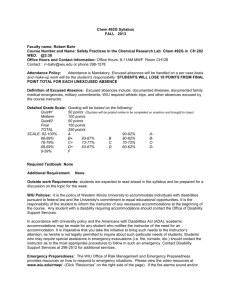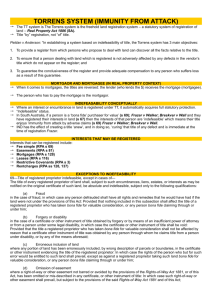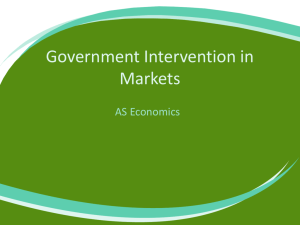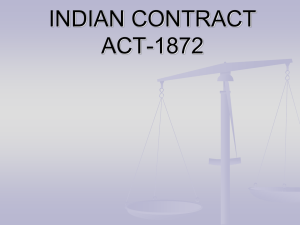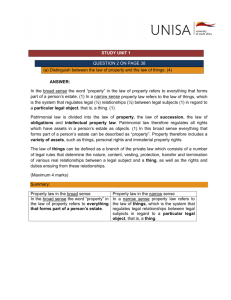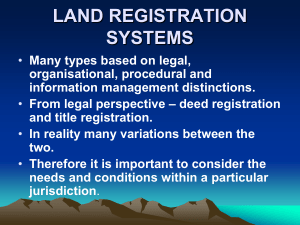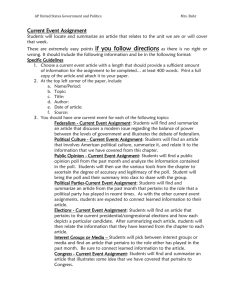document
advertisement
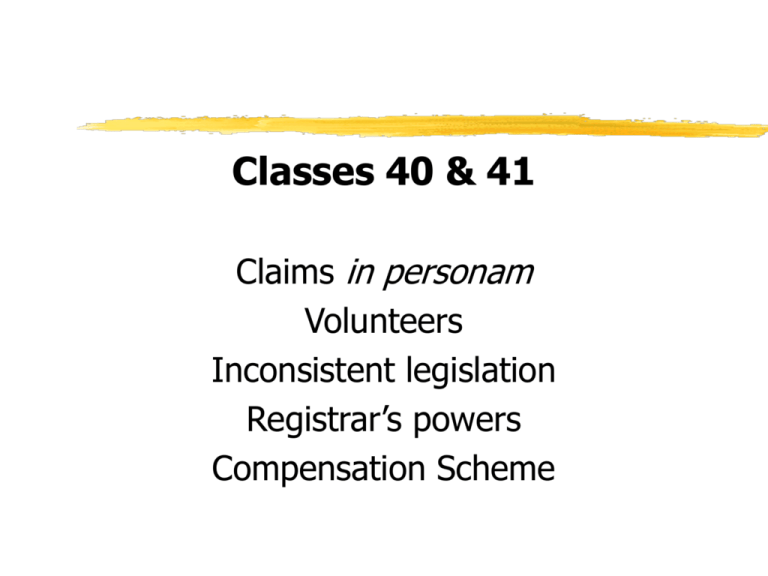
Classes 40 & 41 Claims in personam Volunteers Inconsistent legislation Registrar’s powers Compensation Scheme 13.5.3 Claims in personam • Judge made exception • Concept of indefeasibility of title does not affect personal obligations created by the RP •Frazer v Walker “The principle [of indefeasibility of title] in no way denies the right of the plaintiff to bring against the RP, a claim in personam, founded in law or equity for such relief as the court acting in personam may grant In personam claims • Bahr v Nicolay • Mason CJ Dawson J • Neither the two sections [ss 42 and 43] nor the principles of indefeasibility preclude a claim to an estate or interest in land against a RP arising out of the acts of the RP himself • Actions before or after registration • Conduct gives rise to a known cause of action in law or equity • What actions will be sufficient to give rise to the in personam exception? Bahr v Nicolay • Bahrs were the registered proprietors of land in WA • They agreed to sell the land to Nicholay on the condition that Nicholay lease the land back to the Bahrs for 3 years and then enter into a contract of sale to resell the land to the Bahrs • Nicholay then became the registered proprietor and then sold the land to Thompson who in turn was registered as the proprietor. • Thompson had notice of the agreement between Bahr and Nicholay. • The contract between Nicholay and Thompson contained an express acknowledgment of the agreement. • After Thompson became registered he acknowledged the Bahrs’ interest e.g. he wrote to the Bahrs acknowledging the obligation to sell and offered to sell - although these offers lapsed. • Subsequently Thompson refused to sell and tried to rely on the indefeasible title to defeat any interest the Bahrs’ may have had. Bahr v Nicolay Agreement clause 4 acknowledged Bahr’s right and subsequent letters to Bahr acknowledging their rights Nicolay Thompson RP 1980 agreement clause 6 What rights were created in Bahrs as a result? Bahr What was the effect of this acknowledgement and subsequent conduct both prior to and after obtaining registration Bahr v Nicolay •Indefeasibility of title doesn’t protect the RP from the consequences of their own actions where those actions have given rise to a personal equity in another: Breskvar, Frazer •Vulnerability of RP to claims in personam is not inconsistent with concept of indefeasibility of title •Equity binding RP arising out of transaction after registration may bind the RP- Barry v Heider •Equity created by conduct of RP before registration can be enforced •Here in personam exception where RP purchases having acknowledged existence of prior unregistered interest binding on vendor and having expressly (or by implication) agreed to take subject to his rights •Different characterisations of the nature of the interest Mason CJ Dawson J • What was the nature of the Bahr’s in personam right against Thompsons? • Consider matrix of circumstances in which agreement (T and N) made • Registration of T would expose N to action for breach of contract • Effect of [ss 42, 43] in absence of fraud Thompson’s registration would defeat prior equitable right of Bahrs • Prior to registration, Bahrs prior equitable right prevails over Thompsons • N would not have sold unless T promised to respect the Bahr’s rights • More than a mere acknowledgement of Bahr’s rightspurpose was to provide that the transfer was subject to Bahrs rights • was an intention to create an express trust (of Bahr’s rights) Wilson, Toohey JJ • What rights created by agreement between Bahr and Nicolay? • Specifically enforceable agreement gave rise to equitable interest in Bahrs- commensurate with terms in which specific performance would be granted • Acceptance of indefeasibility does not prevent an action in personam • Actions of Thompsons in taking transfer knowing of rights of Bahrs, accepting the obligation (to retransfer) and communicating it to Bahrs- as basis of the transfer – became constructive trustees for the rights of the Bahrs • If interest of Bahrs (under agreement with Nicolay) fell short of an equitable interest, they had a personal equityenforceable against Thompson Brennan J • What interest did the Bahr’s have? • Equitable interest in land created by specifically enforceable agreement between Bahr and Nicolay • Effect of clause 4? • More than mere acknowledgement, notice • was also acknowledging that Thompson’s interest acquired subject to, limited by rights of Bahrs, intention to be bound • If acquire registration subject to right of unregistered interest then repudiate it- acting fraudulently in equity, equity will prevent fraud by imposing a constructive trust • Apply this reasoning to Silovi v Barbero • What would the outcome of that case be? • Would it have made a difference if Silovi had become registered? What actions will give rise to an in personam exception? • To succeed need to show the claim is • • • • Against the RP or agent/employee Based on a known cause of action in law or equity Proprietary interest or Satisfied by subjecting the RP interest to that of the person bringing the action • Not sufficient • Forging signature on the transfer or the mortgage Mercantile Mutual Life Insurance v Gosper ( 1991) 25 NSWLR 32 • Mrs Gosper RP subject to registered mortgage of Mercantile Mutual Insurance • Husband arranged for variation of mortgage to be taken over by MM Life- forged her signature • Variation registered • Husband took money, spent it and died Mercantile Mutual Life Insurance v Gosper • Mahoney JA • MM Life no authority to produce or use CT to obtain registration of forged variation of mortgage • Used CT in breach of obligation to Mrs Gosper in respect of custody and possession of CT- is a personal equity enforceable against RP of mortgage • Kirby JA• Mrs Gosper right akin to equity of redemption, • possession of CT for limited purposes • Meagher JA (dissent) Vassos v State Bank SA [1993] 2 VR 316 • Did conduct of bank give rise to rights in personam allowing mortgage to be set aside? • Vulnerability of RP to rights in personam not inconsistent with principles of indefeasibility of title • Mere fact of forgery of the instrument (that P and A did not assent to the document) does not give rise to personal equity and so not sufficient for an in personam claim • In personam claim only arises from acts of RP • bank not without neglect but did not act unconscionably, no misuse of power, no knowledge of wrongdoing no improper attempt to rely on legal rights Eade v Vogiazopoulos • Husband forged wife’s signature on mortgage • Fraud? None by RP • In personam? • Can point to no more than forging of her signature and must show something more to found claim in personam • Claim against solicitor? Yes • Claim against assurance fund TLA s 110(3)? Yes Grgic v ANZ (1994) 33 NSWLR 202 • In personam • Argued • Exception should not be confined to known causes of action, should include situations where reliance on registration is unconscientious • Alternatively if must show known cause of action • • • • Deceit False and misleading conduct TPA ss 52, 87 Breach of statutory duty Common law negligence Grgic v ANZ • Held • must be a known cause of action • No in personam remedy for general unconscientious behaviour • Mere fact of forgery of signature is not enough • Caused by RP or persons for whose conduct RP is responsible Pyramid v Scorpion Hotels • Did Pyramid’s solicitor’s conduct give rise to a claim in personam? • Held- no • Must be a known legal or equitable cause of action • Acts/ omissions of solicitor insufficient to ground a cause of action • Negligent but no duty of care to Scorpion (had their own solicitors) • Conduct is that of RP or those for whose conduct the RP is responsible Policy questions • Dividing line between fraud, in personam, negligence, notice? • What effect does the scope of exceptions affect concept of indefeasibility of title? • On what basis should the borderlines be drawn- whose interests to be preferred • Commercial certainty • Whose interests are served by broad exceptions? • Do they have recourse to other means of compensationAssurance fund? • Distinction between wrongdoing by RP or by another? 13.6 Volunteers • Is there any distinction between consequences of registration for volunteers and purchasers for value? • • • • • TLA TLA TLA TLA TLA s. s. s. s. s. 42 43 44(2) 52 110(3) King v Smail [1958] VR 273 • Husband transferred share of family home to wife before entering deed of arrangement with creditors, • Smail as trustee in bankruptcy acquired equitable interest in husband’s property • wife registered • Does wife’s registration give her indefeasible title against the trustee – defeat his equitable interest? King v Smail • Adam J • Interpretation of whole of statute- some provisions draw distinction between volunteer and purchaser, others do not distinguish • Registered volunteer does not acquire indefeasible title free from prior unregistered interests King v Smail • TLA s 43• Protects person getting registered from notice • Protection against notice irrelevant to a volunteer (refer to general law operation of test) • s 43 does not protect a registered volunteer from notice • “By parity of reasoning” if volunteers do not obtain the protection of s 43 they also fall outside the indefeasibility provisions of s 42 Bogdanovic v Koteff (1988) 12 NSWLR 472 • Son registered without notice of Mrs B’s claim • Held • Bound by reasoning in subsequent cases: Frazer v Walker, Breskvar v Wall, • emphasis s 42 indefeasibility on registration • Title by registration, then consider whether any exceptions to indefeasibility • Volunteers are not included in list of exceptions • Contrast fact situation in Ogilvie v Ryan Rasmussen v Rasmussen • Ernest equitable fee simple by way of common intention constructive trust • Harold then registered • Effect of registration? • Coldrey J followed King v Smail • Distinguish Bogdanovic • Breskvar and Frazer are cases about purchasers • No discussion of rationale for distinguishing between indefeasibility of purchaser and volunteer • Bahr reasoning does not destroy principles in King v Smail 13.7 Inconsistent Legislation • Any subsequent inconsistent legislation may overrule or repeal Torrens • Issue with legislation that creates unregistered interests in land 13.7 Inconsistent Legislation • Pratten v Warringah Shire Council [1969] 2 NSWLR 161 • council drainage reserve created pursuant to Local Government Act • RP is inherently subject to the rights crated by overriding statutes • Indefeasibility that flows from registration doesn’t help where the fee simple has in effect been removed from the registration system Trieste Investments v Watson (1963) 64 SR NSW 98 • Were the losses of RP in a similar situation compensable under the Assurance fund? • Majority- no because compensation only payable where there was something missing or lacking from the register book that would expect to be there • There was no default by the Registrar as he was under no duty to note the resumption so there was no error or misdescription • Fergusson J dissent- no need to show fault of Registrar just that RP suffered loss by relying on the CT Inconsistent Legislation • Also Horvath v CBA [1998] VSCA 51 • Spheres of operation of different statutes 13.8 Registrar’s power to correct the Register • TLA s 103(2) slip provisions (a)…upon such evidence as appears to him to be sufficient correct errors in the Register or in any instrument or….but in any case he shall not erase, delete or render illegible the original entry or recording (b) Every correction recording or entry … shall have the like validity and effect as if the error or omission had not occurred but without prejudicing any rights accrued from any recording made in the register prior to the actual time of correcting the error 13.9 Compensation Scheme • Entitlement to indemnity listed in s 110 • For loss or damage (whether by deprivation of land or otherwise) s 110(1) • Note in Victoria no specific category for those losing interest as the result of fraud- need to fit within another head such as • 110(1)(c) any error of misdescription in the Register or the registration of any other person as proprietor • s 111 Registrar may compensate without a claim being made • Amount – limited in s 110(4) Compensation Scheme • s 110(3) no indemnity available where: • RP or agent/ solicitor caused or substantially contributed to the loss by fraud, neglect or wilful default • Vassos v State Bank of SA • Eade v Vogiazopoulos • Derive title from a person who (or whose solicitor/agent) has been guilty of fraud neglect or wilful default (unless valuable consideration given).. etc • 109(2) no indemnity where: • Loss or damage or deprivation occasioned by any breach of trust whether express implied or constructive… etc Compensation Scheme • Relevance of title insurance?
